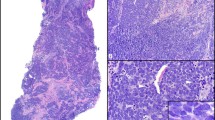Abstract.
Merkel cell carcinoma (MCC) is a highly aggressive neuroendocrine carcinoma of the skin. More than one-third of MCC patients will die from this cancer, making it twice as lethal as malignant melanoma. Despite the fact that MCC is still a very rare tumor, its incidence is rapidly increasing; the American Cancer Society estimates for 2008 almost 1 500 new cases in the USA. These clinical observations are especially disturbing as the pathogenesis of MCC is not yet fully understood; however, a number of recent reports contribute to a better understanding of its pathogenesis. Here we describe findings regarding the role of Wnt, MAPK and Akt signaling as well as possible aberrations in the p14ARF/p53/RB tumor suppressor network in MCC. Most important, and possibly with high impact on future therapeutic approaches is the demonstration that a polyomavirus has frequently integrated in the genome of the MCC cells prior to tumor development.
Similar content being viewed by others
Author information
Authors and Affiliations
Corresponding author
Additional information
Received 12 August 2008; received after revision 06 October 2008; accepted 22 October 2008
Rights and permissions
About this article
Cite this article
Becker, J.C., Schrama, D. & Houben, R. Merkel cell carcinoma. Cell. Mol. Life Sci. 66, 1 (2009). https://doi.org/10.1007/s00018-008-8483-6
Published:
DOI: https://doi.org/10.1007/s00018-008-8483-6




